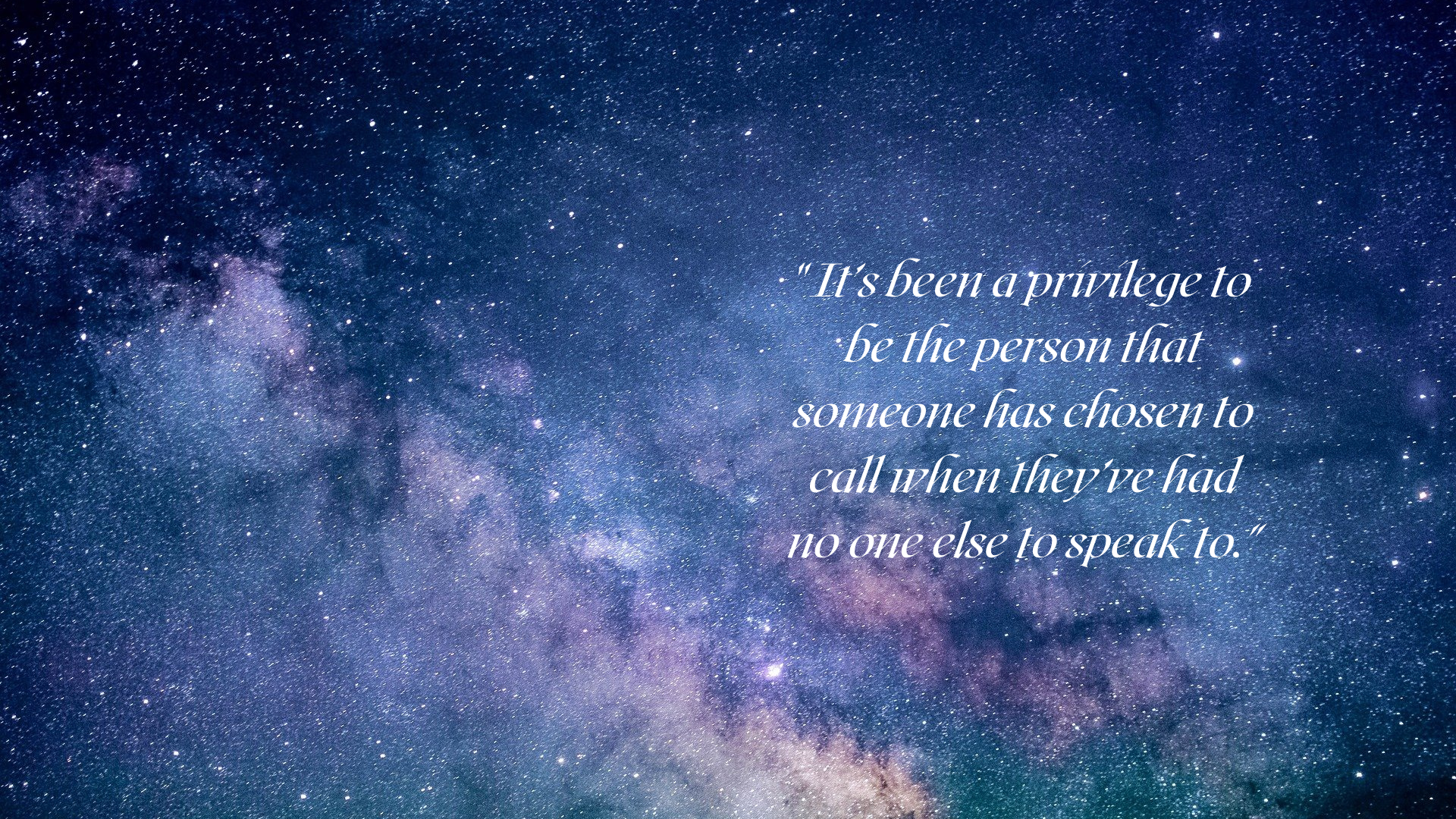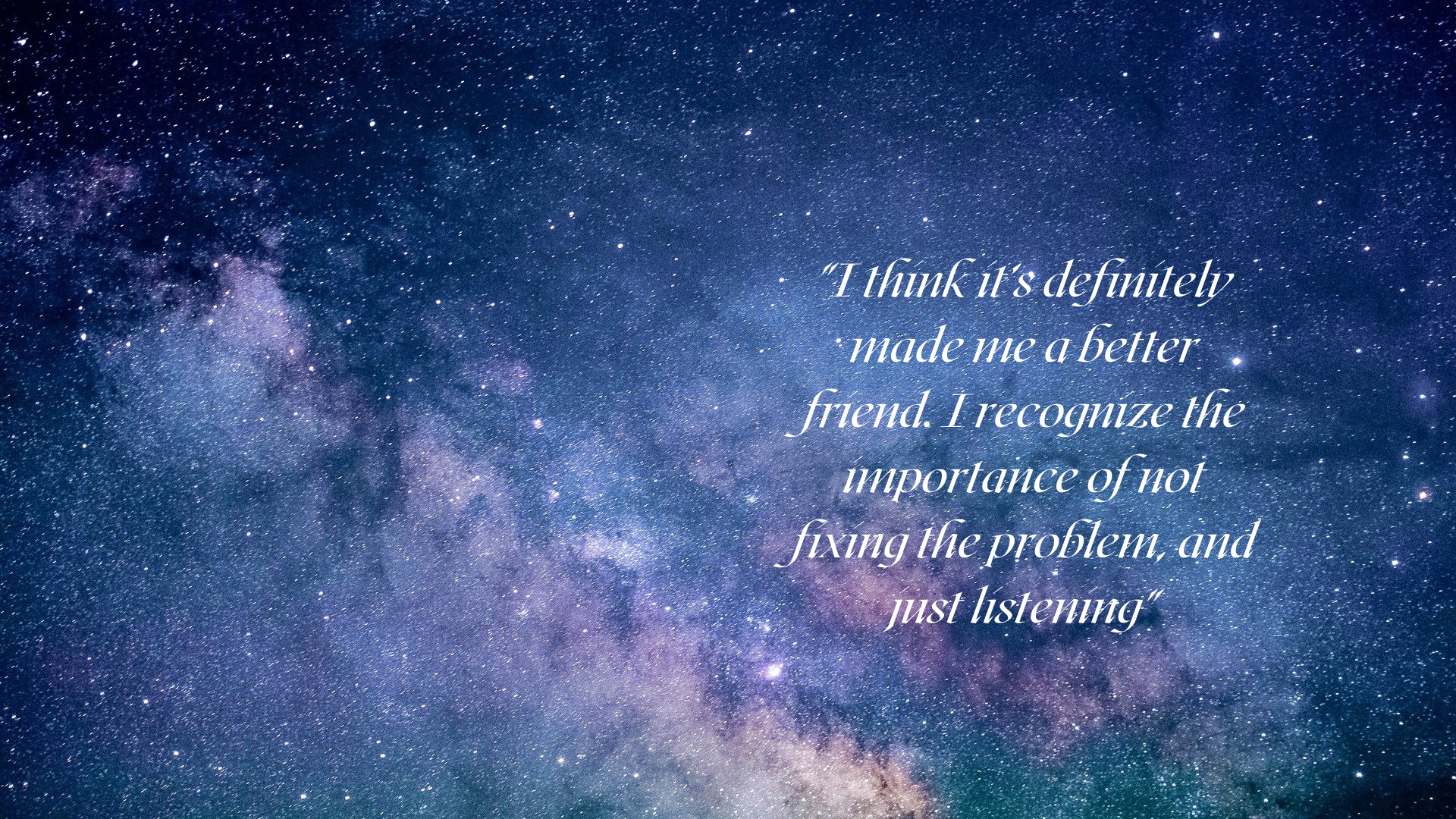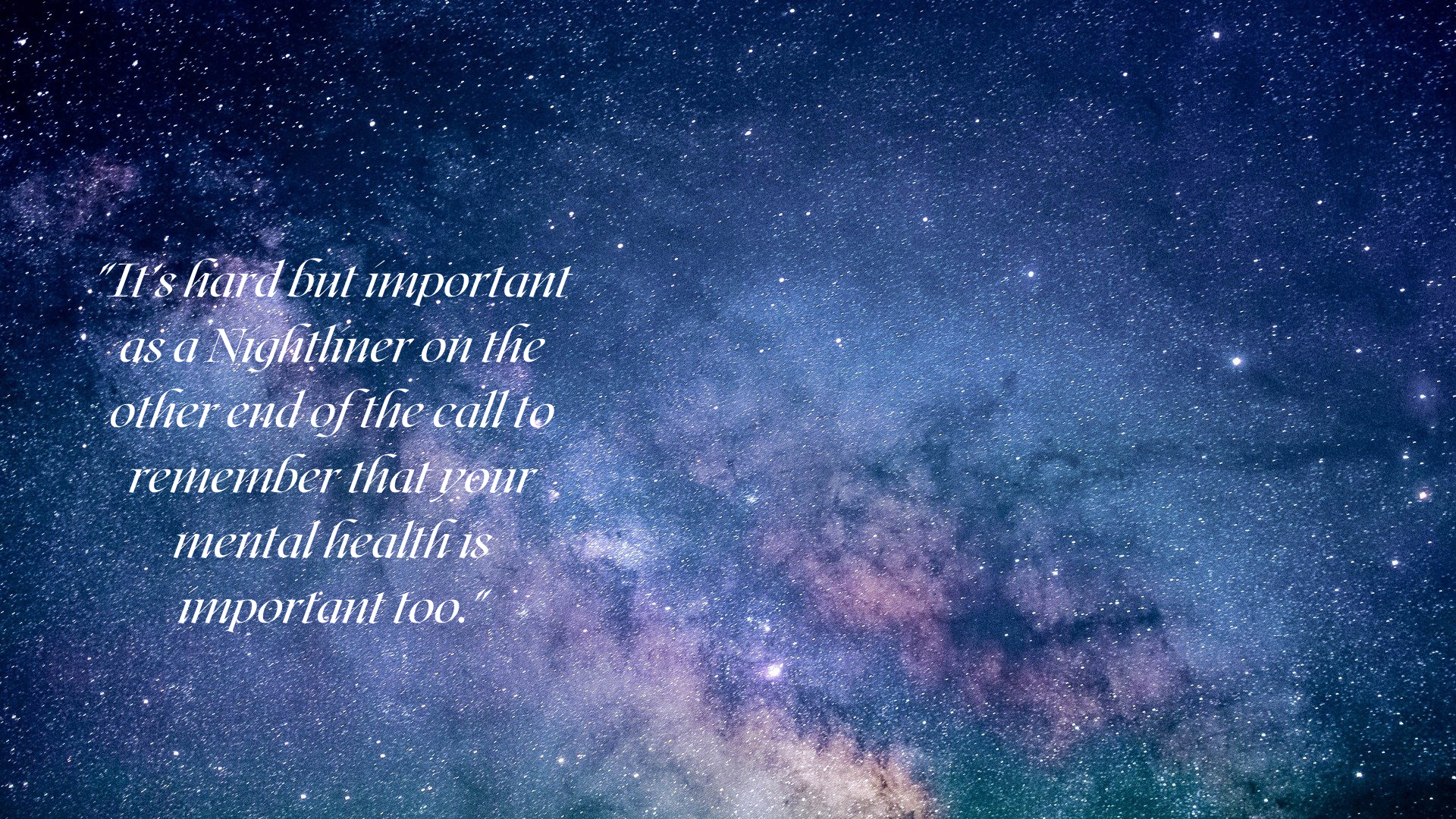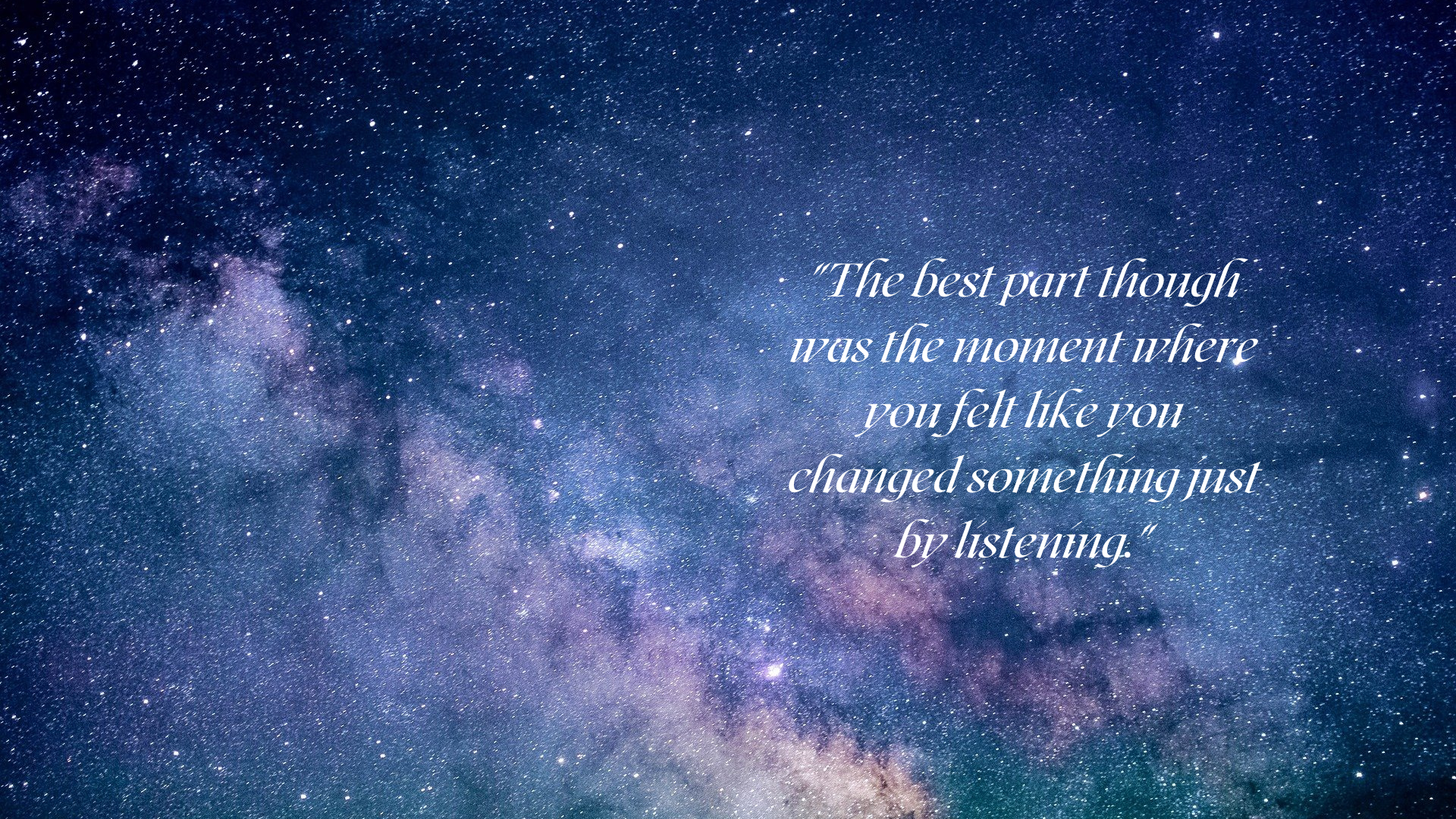The secrets of a
Nightline listener:
Revealing the unheard voices of
student mental health support services

Being a university student can simultaneously feel like one of the best times and one of the worst times of your life.
Feelings of isolation, anxiety, and being overwhelmed are amplified during a time of discovering yourself and gaining independence.
Those feelings gain momentum during the night, when students are entirely alone with their thoughts and struggles, and feel as though there is no one to talk to.
It is during this time when many students seek support from Nightline – an anonymous, non-advisory listening service run for students by students, through phone calls, texts, instant messaging services or emails.
Nightline offers a listening ear to students who need to talk, or to cry, or to feel less alone with their problems.

The service, which runs during term-time at over 40 universities around the country (as displayed on the map below), consists of trained students using active listening skills to support their peers through any difficulties they may be feeling.
These struggles may include mental health, suicide or self-harm, seeking medical information, sexual violence or abuse, or academic stress, along with so many other issues students feel.
It’s #TimeToTalk and we are here to listen. If you are in need of a listening ear, be that via the phone, Instant Message or email, please find your Nightline service now: https://t.co/FGhGVVYwwG
— NightlineAssociation (@NightlineAssoc) February 1, 2018
We’ll #ListenNotLecture. pic.twitter.com/lzRBGBOqXH
A 2013 Youthsight study showed that, in a sample of more than 1000 university students across the UK, of those who reported feeling distressed, 72% explicitely felt distressed during night time. Of those who contacted their university Nightline services:
- 87% felt their mental wellbeing had improved
- 79% felt better able to deal with the problem
- 75% felt calmer, less agitated or less anxious
Emily, 21, volunteered as a Nightliner at Durham University during her final year:
“Being a Nightliner has meant being a listening ear for someone, which I think is really important.
“I know a lot of university students in particular can be really lonely, and have no one else to turn to, or have tried to talk to their friends and family but haven’t been able to, for whatever reason.
“It’s been a privilege to be the person that someone has chosen to call when they’ve had no one else to speak to.
“I think Nightline is so valuable because often people don’t have anyone else to turn to, and it’s really important to always be there for somewhere that might need you in a time of crisis.
“Nightline volunteers are trained to be there, and it makes them more appropriate listeners, and a lot of the time they do know what to say and how to help by listening actively – which is a skill I think most people don’t really have.
“The people, the Nightliners themselves, are fully trained to be there and provide the right support without inflaming or escalating the situation.
“I think it’s definitely made me a better friend. I recognize the importance of not fixing the problem, and just listening, and empathising as opposed to offering advice.
“A lot of the time people just want to vent their problems, and they don’t need you to fix things.
“I’ve become a more empathetic person, and learnt not to judge someone because you don’t know their full story.
“I’ve learnt the difference between listening actively, and listening just to reply, which I think is a big problem that people tend to do by responding and trying to fix problems, instead of just listening and accepting the situation for what it is.
“I think nightline taught me the importance of having a support network, because even though I don’t know who the caller is, it does stick to you and you do think about what they’re going through.
“Something I found the most difficult was the feeling of powerlessness, because as much as you’re a listening ear to offer, you have no idea who this caller is, and no way of ever knowing or talking to them again, and I think that is really difficult to overcome.
“You have no power to really stop them from doing something, but I just think that you’re so far removed from this person that you have no power in helping them in certain ways, although in other ways you are definitely helping them just by listening to them – either when no one else will or no one else can.
“I think it’s just a really privileged position to be in, to be the person they feel like they can speak to.
“Often they’ve never said any of this before out loud, so I think it is a really special thing to be the person that they feel comfortable talking to.
“I do think you can have a real positive impact on the callers, even when it is a really difficult call and even with the not knowing, I just think ‘I was the person that they chose to speak to and that they opened up to’ and I think that is a really unique and privileged position to have been in.”


Providing emotional support to students in their hours of need is a highly valuable role to hold, as well as a vital position for universities to implement.
As shown by the word cloud graphic above, students need a listening ear for a variety of reasons: exams, walking home alone at night, trying to understand forms of trauma they’ve faced, or loneliness.
One factor that has caused many students’ to suffer and require support has been the pandemic.
The graphic on the left showcases how student mental health has been affected during their first terms of university last year – when the pandemic was creating great uncertainty, and this year – when a sense of a ‘new normal’ had begun.
The typical anxieties of university, exacerbated by the pandemic, resulted in a greater need for student support, as a high number of students stated their mental health was slightly worse or much worse now than it had been only a few weeks before, at the beginning of the term.
Following from this, a significantly high percentage of students were concerned at the major risk Covid-19 posed to the mental health of their friends or relatives, including their peers.
As the pandemic created this increased stress on services like Nightline and The Samaritans, and students felt more in need of support for their mental health, Nightline volunteers became valuable assets to university communities, despite the fact their roles remained a secret, and for many their mental health was side-lined in their own efforts to help others.
While research and resources, including the graphics above, are being dedicated to provide support for the mental health of students needing support from listening service calls, little is known about the other side of these callers - the stories of the volunteers themselves.
On a typical night, a volunteer will go to their Nightline office, having told only a few select housemates or partners of this ‘secret identity’, and will be prepared to take anything between one to eight calls a night, sometimes none, sometimes far more.
In most cases, the volunteer will be on duty with another, and will stay awake all night, ready to pick up the phone when required, before returning to their homes in the early hours of the next day, and perhaps by this point needing their own mental health and welfare support.
The volunteers will be trained to provide medical information, talk a suicidal person through their thoughts of death, relive an experience of trauma with a volunteer, or listen to someone cry before falling asleep on the other end of the phone.
With isolating lockdowns in university halls, health anxieties, and the inevitable homesickness students find themselves feeling, Nightline volunteers have spent the last two years preparing for the worst.
They have been told and trained to anticipate longer, more frequent, and potentially more serious calls.
As a Nightline volunteer, I’ve witnessed the realities of students feeling as though they have no one else to turn to.
Private therapy is often unaffordable and out of reach, whilst universities fail to take action and refer students to counseling without sufficient evidence of poor mental health (which in itself is difficult to prove). Furthermore, the taboo of visiting student welfare support officers deters those who need help the most.
Often, students share that they have no one else who believes them, whether friends, family, or university staff, and express gratitude at finally having someone to listen to them, without passing judgement or offering unsolicited advice.
Students disclose their secrets, their horror stories, or they just sit in silence, comforted by the feeling of knowing someone is there for them on the other end of the phone.

Ella, 21, volunteered at The University of Cambridge, where she witnessed the effect of the pandemic on students:
“Being a Nightliner has meant so much to me.
“It became almost addictive.
“The feeling I got from doing this, and meeting other Nightliners, was something I didn’t want to let go of.
“I think there’s something so special about the fact that you all know each other, but nobody else knows, nor knows the context in which you know each other.
“The nature of volunteering for Nightline means that you feel really close to people, and it opens up this really intimate relationship that you don’t get anywhere else, skipping all of the normal levels of being friends with someone.
“I think Nightline is valuable to the students who call in and use it probably because of the nature of the fact that it runs at night, because night time is the time when most students, anyone really, is most alone.
“It’s a time when we’re all alone with our own thoughts and sometimes you feel like you have nowhere to go with them, and I think that’s what makes it really valuable.
“Because everyone answering the phone is a student, you’re calling someone who would naturally have some level of joint understanding and empathy.
“Yet, you don’t have to know them.
“In terms of dealing with more difficult calls and my own mental health from volunteering, I definitely think there are times when it was hard.
“I think what really helped me was learning how to compartmentalize time when I was on shift, and being able to separate a person’s call from myself and my own responsibility once that phone line has ended.
“But, at the same time, that’s an overly optimistic thing to say.
“It’s not easy.
“It’s not an easy thing to take a really difficult call, then once the phone is down, go back to being a student.
“It’s hard but important as a Nightliner on the other end of the call to remember that your mental health is important too.
“It’s a feeling of guilt, or an obligation to do it, to help other people because that’s what you’ve signed up for.
“I think it was so much harder during the pandemic because suddenly you’ve got more students trying to call in, with so much more anxiety and so many more struggles, so there’s this increased need for the service, especially because the support systems in place at university suddenly were dissolving because of pandemic issues.
“People felt more isolated, their mental health was suffering more, and they need a service like Nightline more, but at the same time it becomes difficult to run that service, as the volunteers are isolating or physically can’t take shifts, but also because the Nightliners themselves are facing the pandemic-anxiety too.
“Being trained as a Nightliner has affected me so much more than I ever thought it would.
“A lot of the things we do in active listening are quite natural, like making listening noises or ‘mhmm’ prompts, but when your friends are off-loading on you and you notice yourself making these ‘listening noises’ you start to think about whether you’re treating them like a caller instead of a person who you know.
“More than anything, the most valuable thing I learnt was about not just jumping to conclusions and giving people advice.
“As people we tend to be problem-solvers, we try to fix something by giving advice.
“Before I was trained I was so much more dubious about how much help you can give someone just by sitting with them and listening to them, and asking valuable questions, without having to offer any of your own opinions.
“When people come to you with a problem, they don’t want a solution, they just want to be heard. So being trained in this way has made me slow down in those types of conversations, and ask myself: ‘Am I really giving this person what they want?’”


Jesper, 24, was a volunteer for all the universities that fell within London Nightline's branch, and therefore had to adapt to take calls from students of other universities.
“For me, being a Nightliner has taught me a lot about human psychology.
“I can better understand the struggles and differences between people, and I’ve learnt to not just assume anything because often there is a lot more to people’s lives than one might anticipate.
“I’ve realised how important it is to have someone just to listen to you, and doesn’t judge you.
“Often it can be very difficult to open up about some problems in your life, because you’re scared of being judged by people, and I feel like Nightline really fills that void, just by being there to listen and have no judgement towards you.
“It is common that people like to hear their own voice more, and I’ve definitely found myself now not trying to offer advice, but just listen.
“Often, people already know what they want to do, the people with the problem know the best how to handle it, and I shouldn’t be the one to try and change or influence that.
“I went in knowing that the reason why I was there was to help someone else, and whatever I did was helpful so when they called and had something that was difficult in their life, I found it easier to cope knowing that in some way I had helped them by being there on that call.
“The not knowing what happened afterwards, in particular when it came to calls of the nature of self-harm, that was definitely difficult, and that is something that would carry on beyond just the phone call. That’s for sure.
“The hardest part of being a Nightliner for me was the not knowing, especially in regards to calls about self-harm.
“I had a few of those calls, and they’re definitely the ones that you carry with you for the longest, and to this day is something I still think about.
“The best part though was the moment where you felt like you changed something just by listening.
“There were many calls that were sad calls, where people were very emotional and crying, but other calls were also very happy.
“Sometimes it was just people who had nobody else to talk to, because they were lonely, and that didn’t always have to be in a negative manner.
“Sometimes they just had a really good day and just felt like they wanted to chat to someone.
“There were also those where things might have started off really rough, where they called you already crying, but then later on in the call they would say things like ‘I feel really calm now’ and ‘I’m ready to go and do this’.
“Those felt like an achievement, like you felt as though you knew what would happen afterwards and the situation has changed for the better, or on the surface it seemed like it.”
